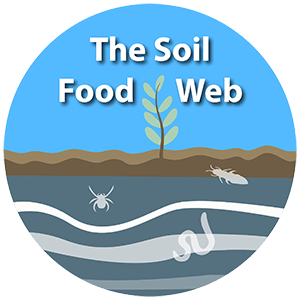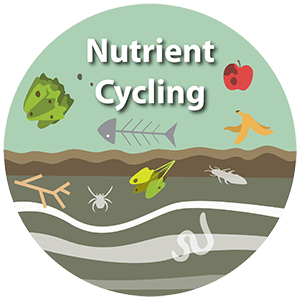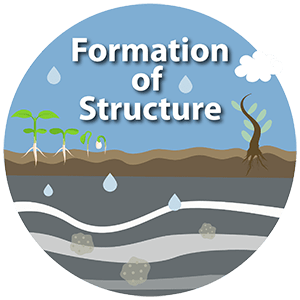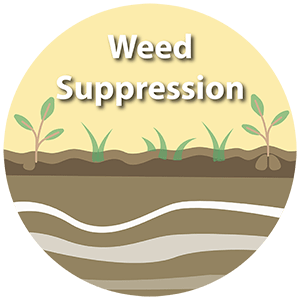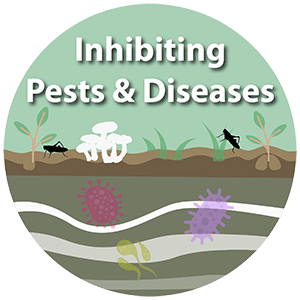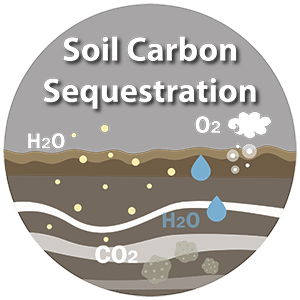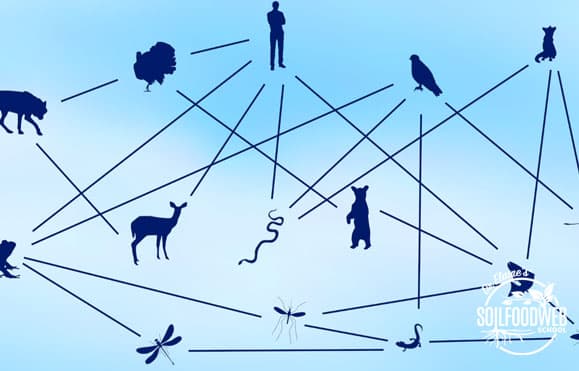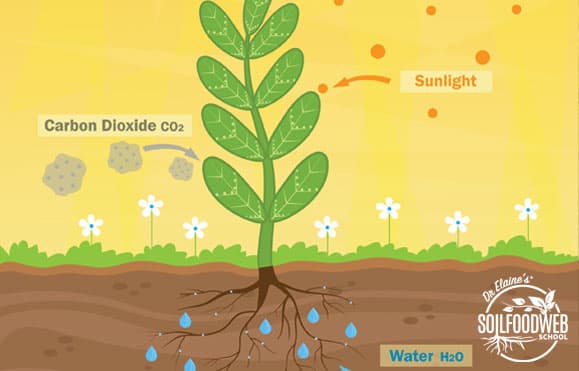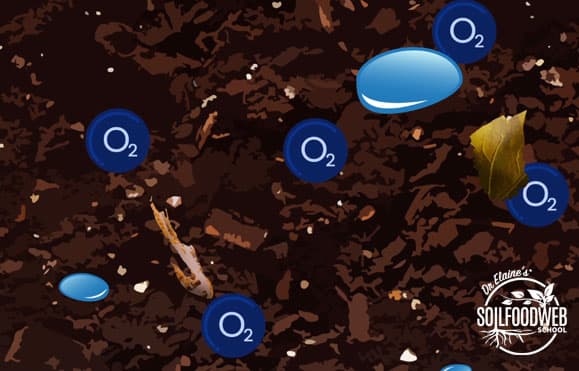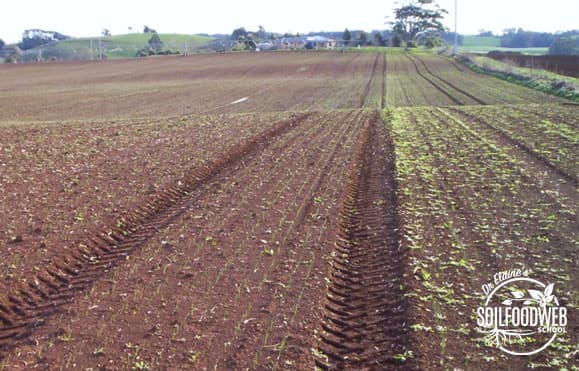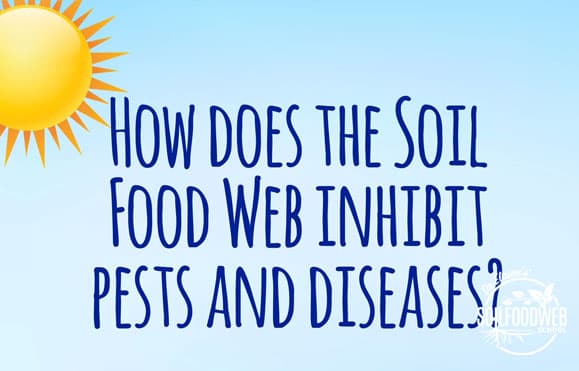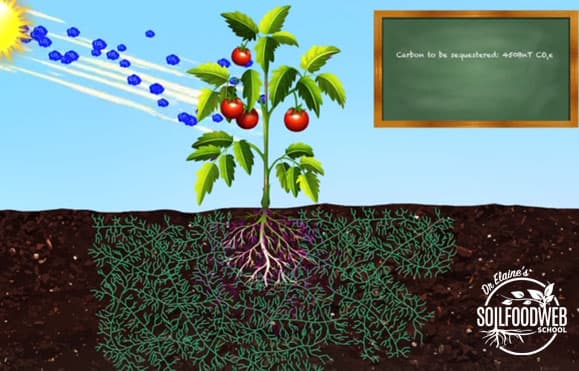Watch the animations below to learn how the Soil Food Web works.
What is the Soil Food Web?
In this series of animations you will discover how the Soil Food Web works in harmony with plants to produce a number of benefits including:
- Increased Yields
- Protection from Pests and Diseases
- Reduced Irrigation Requirements
- No need for Fertilizers
- Weed Suppression
- Protection against Soil Erosion
- Carbon Sequestration
- Protection of Insects and Birds
And more…
Nutrient Cycling
This is the process by which beneficial microorganisms harvest nutrients from soil organic matter and also from the ‘parent material’. Rocks, pebbles, sand particles, silts and clays are all considered ‘parent material’. On a molecular level, they comprise crystalline structures that are not easily broken down. These structures contain atoms of iron, boron, phosphorus, calcium, potassium etc. Plants are not capable of directly accessing the nutrients in these structures.
Read More...
Bacteria and fungi, however, produce enzymes that break-down these structures, thus releasing the nutrients they contain. The bacteria and fungi readily absorb these nutrients, which are later made available to plant roots when bacterial and fungal predators consume their prey and subsequently excrete their waste. It is this waste material that plants absorb – a nutrient dense liquid food source that can be absorbed directly into the plant root.
Plants produce simple sugars in the process of photosynthesis. They then inject around 30-40% of these sugars (along with other compounds they produce, collectively known as exudates) into the soil. This is a deliberate action, taken in order to feed bacteria and fungi whose numbers then grow as a result. The plant is effectively making an investment in these microorganisms. Once the bacteria and fungi have begun to harvest nutrients by mining the parent material and decomposing organic matter, the plant will receive a return on their investment – assuming of course that the predator organisms are present. This is a critical factor, which highlights the requirement for the full Soil Food Web to be present. Dr. Ingham and her colleagues demonstrated clearly that Nutrient Cycling cannot take place without both decomposer and predators being present. Furthermore, these groups must be balanced in proportion to each other and to the needs of the plant species being grown.
The Formation of Structure
Beneficial bacteria produce glues that facilitate the formation of microaggregates – small clumps of bacteria, organic matter and soil particles (sand, silt and clay). Fungal hyphae then bind these microaggregates together forming larger clumps, known as macroaggregates. As more materials are bound together, voids are created and structure is formed.
Resistance to Soil Erosion by Wind: A well structured soil is more able to resist wind erosion than an unstructured desert soil, which is easily blown away.
Read More...
Resistance to Soil Erosion by Water: A well structured soil allows excess water to flow through it. In a compacted soil, however, water logging occurs above the compaction layer and if a gradient exists, the saturated soil is able to move and is often washed-away into rivers and oceans. Beneficial microorganisms can deconstruct existing compaction layers and prevent the formation of new ones.
Reduced Irrigation Requirements: A well structured soil, with high organic matter content, acts like a sponge holding water for extended periods of time. This, coupled with the fact that plant roots are able to penetrate much deeper in a structured soil, means that irrigation requirements can be halved in year one (in some cases), when the soil food web is successfully restored. This is the case in sandy soils where water holding capacity is usually very low. In clay soils, water logging is very common. This is due to the fact that clay particles, or platelets, are flat and frequently stack closely together, resulting in compaction layers. With the presence of the Soil Food Web, the process of flocculation takes place, which results in clay particles repelling each other, thus enabling compaction layers to be broken-up and structure to form.
Weed Suppression
The presence of beneficial fungi in the soil has been shown to significantly inhibit the growth of weeds. This is because beneficial fungi secret acidic enzymes which lower soil pH. The reduced pH levels inhibit the ability of nitrifying bacteria to transform ammonia, one form of nitrogen, into nitrates, a second form of nitrogen that is vital for weeds to flourish.
Inhibiting Pests and Diseases
The vast majority of disease causing microorganisms are anaerobes, meaning they thrive in low oxygen conditions and that they shut-down in oxygen rich environments. The opposite is true for beneficial microorganisms. A well-structured soil allows air to flow in, creating an oxygen rich environment (>6ppm) which selects for beneficial microorganisms and suppresses disease causing organisms.
Read More...
With the Soil Food Web in place, the plant is nutrient rich and therefore better able to protect itself, whilst diseases are inhibited by the conditions in the soil.
The world’s insect populations are crashing. A recent study found that they have been decreasing around the world by approx. 2.5% every year for the last 30 years. The main causes are thought to be chemical agriculture and climate change. Pesticides kill indiscriminately and are thought to be linked to the recent reduction in bee populations. Birds and small animals that feed on insects are also under threat. A recent study showed that bird populations in France have declined by 30% in the last 15 years. By negating the use of pesticides and other toxic chemicals, such as herbicides, the Soil Food Web can be employed to mitigate the threat of ecological collapse.
Soil Carbon Sequestration
Climate change poses an existential threat to humanity. Soil carbon sequestration is widely being recognized as a part of the solution to this problem. Here’s how it works: Plants absorb carbon from the atmosphere during photosynthesis, producing simple sugars and other related compounds. Plants then invest a substantial proportion (~40%) of these carbon-rich compounds (exudates) into the soil , in order to feed specific groups of microorganisms, namely bacteria and fungi. They do this because they expect to receive nutrients in return (as explained above).
Read More...
Bacteria and fungi use this carbon-rich food source to increase their numbers, building their bodies predominantly from carbon. Fungal hyphae can remain intact in the soil for hundreds of years, and are thereby capable of locking up large quantities of carbon in the soil. Some scientists have been able to increase soil carbon by as much as 20 (metric) tonnes per hectare, per year. It has been estimated that by regenerating the world’s soils using the Soil Food Web, we can take atmospheric carbon levels back to the ‘safe-level’ as defined by the United Nations IPCC – which is 350ppm, and that this could be achieved within 15 years or less!



